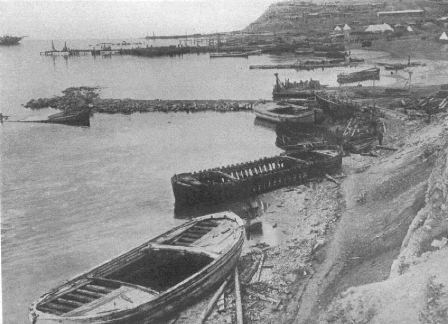30 December 1915
HELLES - Behind the facade of recent offensive mining and small scale trench actions the final planning for the evacuation was continuing. On December 30, the news of which was filtered down to the officers of all the units. This included Captain John Gillam, whose advise was sought.
 Left: W Beach / Lancashire Landing very late on in the campaign, and possibly post evacuation.
Left: W Beach / Lancashire Landing very late on in the campaign, and possibly post evacuation.
"Today we hear the news secretly that we are evacuating Helles altogether. They are having a conference at Corps H.Q. this morning on the plans. I am sent for by the Engineer officer in charge of works on the beach, and he questions me closely on the plans that were followed at the last evacuation. But I can tell him little or nothing beyond what I personally observed. I am afraid that we shall not be able to get away supplies and stores so easily as we were able to at Suvla, and quantities will have to be left. For the beaches are under close observation from Yen-i-Shehr and Kum Kale, and now that we have already hoodwinked them once, the second evacuation will have to be done very carefully. Therefore our only chance of getting away stores is by night, and animals, guns, and personnel must come first. The first thing, therefore, is to get up forward supplies in sufficient quantities to last out the remaining days, and I receive orders to get these up for the 87th and 88th Brigades, for again we are to be last off.
I expected this second evacuation. Nearly everybody expected it. We have been told that IX Corps would relieve VIII Corps, but to those of us who experienced the Suvla storm, the idea of hanging on here after Suvla and Anzac had been evacuated was impossible to consider. But this evacuation we think will be a very different matter, with the Turks expecting us to endeavour to make it.
An arduous night, and we get to bed in the small hours of the morning. All day we had intervals of howitzers from Achi and Asia's shells. Not much longer now, thank God!" (Captain John Gillam, Army Service Corps, 29th Divisional Supply Train)
SOURCE:
J. Gillam, Gallipoli Diary, (Stevenage, The Strong Oak Press, 1989), pp.308-309.
